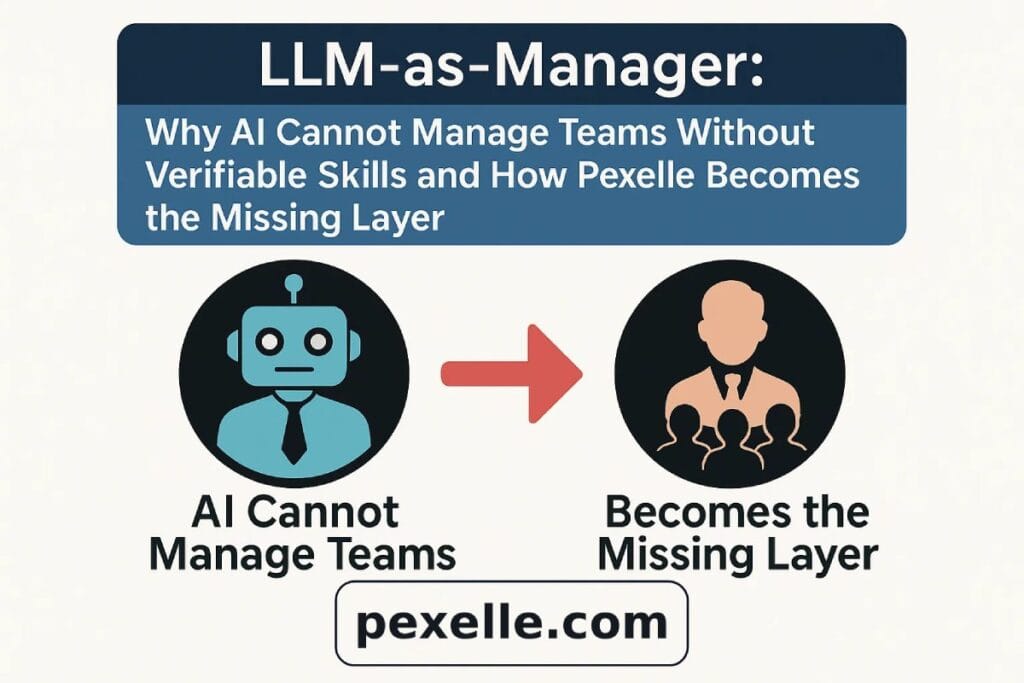LLM-as-Manager: Why AI Cannot Manage Teams Without Verifiable Skills and How Pexelle Becomes the Missing Layer

The 2025 shift from human-led project management to AI-driven task orchestration demands a new standard of skill verification.
1. The Rise of AI as the New Project Manager
By 2025, companies are rapidly adopting LLM-as-Manager systems: autonomous AI agents capable of planning work, assigning tasks, tracking progress, and evaluating outcomes. These models are not assistants anymore they are decision-makers.
AI managers now:
- break projects into tasks
- determine required skills
- match tasks to the right person
- evaluate performance
- suggest upskilling paths
- adjust workflows in real time
This is the new operational backbone of modern teams.
But there’s a critical issue:
AI can only make good decisions if it has trustworthy, structured, verifiable data about people’s skills.
And right now, it doesn’t.
2. The Core Problem: AI Managers Cannot Trust Human-Declared Skills
AI doesn’t understand vague statements like:
- “I’m strong in Python.”
- “I’ve led complex projects.”
- “I have 5 years of experience.”
These are not data.
They are claims.
AI managers cannot act on claims they require proof, structure, and machine-readable signals.
Without verifiable credentials, LLM-managers suffer from:
- wrong task assignments
- misjudged skill depth
- incorrect workload distribution
- inaccurate performance scoring
- inefficient team planning
In other words, AI becomes a blind manager.
3. Why AI Needs Skill Graphs, Not Skill Lists
Traditional CVs and profiles provide lists of skills, but AI needs graphs, meaning:
- skill → micro-skill hierarchy
- skill → project relationships
- skill → difficulty level
- skill → toolchains used
- skill → evidence connections
- skill → freshness (recent use)
- skill → performance scores
LLMs operate on relationships and patterns.
A skill graph gives them the structure needed to reason accurately.
Without these graphs, AI makes shallow and often wrong decisions.
4. AI Task Allocation Requires Verifiable Inputs
When an AI is deciding:
“Who should build this API endpoint?”
it must compute:
- backend skill depth
- familiarity with the architecture
- previous project performance
- speed vs. accuracy trade-offs
- recent activity
- relevant tool experience
- risk profile
If all it has is:
“Backend Developer Node.js, MongoDB, AWS”
the AI cannot judge competence.
LLMs need evidence-backed data, not titles.
5. AI Evaluation Systems Need Ground Truth
AI managers don’t just assign work; they evaluate outcomes.
To rate task performance correctly, the AI must understand:
- expected output quality
- past performance patterns
- baseline skill level
- project history
- dependency context
This is impossible without historical, verified skill data.
Otherwise, AI scorecards become meaningless.
6. The Explosion of AI-Based Skill Fraud
2025 saw a boom in AI-generated:
- fake CVs
- synthetic project samples
- fabricated GitHub repos
- hallucinated experience
- AI-written portfolios
- AI-enhanced coding tests
LLM managers cannot filter genuine skill from synthetic output unless they have access to verifiable provenance.
This is where everything breaks without Pexelle.
7. How Pexelle Fixes the Blind Spots of LLM Managers
Pexelle provides the data layer AI managers must rely on.
✔ 1. Skill Provenance
AI receives a full trace of:
- where the skill was learned
- how it was practiced
- evidence behind it
- progression over time
✔ 2. Evidence-Based Skill Graphs
Instead of claims, AI gets a dynamic map of:
- micro-skill events
- project contributions
- code artifacts
- evaluations
- timestamps
This allows AI to understand competence contextually.
✔ 3. Real Project Metadata
AI can view:
- commit patterns
- task outputs
- difficulty ratings
- project complexity
- collaboration signals
This lets LLMs assign tasks with far higher accuracy.
✔ 4. AI-Verified Performance Data
Pexelle integrates:
- task scoring
- quality evaluation
- originality checks
- effort estimation
- error detection
So AI managers rely on trusted, validated data instead of human claims.
✔ 5. On-Chain or Immutable Validation (Optional)
For sensitive roles, AI managers need proof that cannot be forged.
Pexelle’s optional on-chain attestations provide exactly that.
8. Without Pexelle, AI Managers Make Wrong Decisions
Here’s what happens if you remove the verification layer:
- inexperienced people get assigned senior tasks
- teams underperform
- timelines blow up
- high-risk tasks go to the wrong individuals
- AI misinterprets skill levels
- evaluations become inaccurate
- skill gaps remain hidden
AI becomes a manager with no visibility dangerous and inefficient.
9. With Pexelle, AI Managers Become Extremely Accurate
When AI has access to structured, verified skill graphs:
- task allocation becomes optimal
- team output improves
- risk decreases
- delivery speed increases
- performance scoring becomes fair
- upskilling pathways become personalized
- team planning becomes predictable
AI becomes a competent manager, not a blind one.
10. The Future: Autonomous Teams With Verified Talent Infrastructure
By 2030:
- AI will manage entire teams end-to-end
- humans will focus on creation, not coordination
- project planning will be fully autonomous
- talent ranking will be AI-driven
- proof-based identities will replace résumés
But all of this requires what Pexelle provides:
A verifiable, evidence-rich layer of human capability.
Without it, the entire AI-as-manager ecosystem collapses.
11. Conclusion: AI Can’t Lead Without Trustable Skill Data And Pexelle Provides That Trust
LLM-as-Manager is the future of work, but only if the AI has:
- verifiable skills
- real project evidence
- trustworthy performance data
- structured skill graphs
- provenance-rich credentials
Pexelle is the infrastructure that turns raw talent into AI-usable, verifiable, trustable data without which AI managers simply cannot function.
AI can automate management.
Pexelle makes sure it manages the right people the right way.Source : Medium.com




